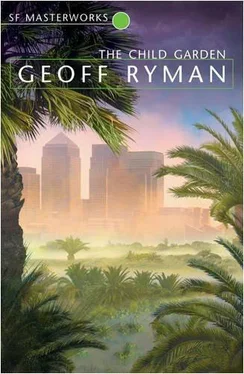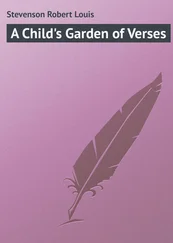Rolfa appeared at the top of the staircase. She was trying to wear a dress, and looked like an unsteady column of crumpled satin. She began her descent, clutching the handrail, stumbling, swaying. Her feet kept catching on the inside of her hem, making frantic motions within it like trapped rabbits.
Rolfa, lift the dress up, Milena willed, silently.
Rolfa’s hair had been brushed back out of her eyes and was held up by two pink resin butterfly clips that looked like lopsided ears. Braving the distance between the staircase and Milena, Rolfa held out something soft and black. It was a fur.
‘We usually dine upstairs,’ Rolfa said, as if to a stranger.
‘Thank you,’ said Milena for the fur, and wrapped it around herself, her teeth chattering.
‘Follow me,’ said Rolfa and began the ascent. She stood once more on the hem of her dress, and had to hold out a hand to catch herself.
‘Rolfa,’ whispered Milena. ‘Up. Hold it up.’
There was a collapse of laughter from the cousins behind them.
There was something majestic about the way Rolfa ignored them. She bent over and lifted up her dress from the bottom, exposing her knees, and climbed the stairs.
There were chandeliers overhead. They blazed with light. There was a chug-chugging noise in the background. A private generator. There were paintings, extravagances of flowers or empty street scenes at dusk. But no people. Thick wires trailed alongside the carpet on the stairs, and from somewhere came the singing of a circular saw. The cold sunk into Milena’s bones.
‘Want to wash your hands?’ Rolfa asked, quickly.
‘I think they’d freeze if I did,’ replied Milena, watching her breath rise as vapour. I wonder, she thought, if my eyebrows are frosted.
‘In here,’ said Rolfa. Her voice was higher and softer than usual, very precise but barely audible as if there was no force of breath or personality behind it. Milena was shown into a room that made her gasp.
Capitalism, she said to herself. Capitalism was what she thought she was seeing. It was the only word she had for it.
There was a polished mahogany table. Little rough wooden boots had been nailed to the bottom of each leg to make it tall enough for GEs. There were more real paintings on the walls, another showerburst of light overhead deflected through crystal. There was an enormous covered dish made of silver on the middle of the table. It was twice as long as Milena was tall. There were silver knives, silver forks, silver candlesticks, matching mahogany chairs and, in the corner, a tin rubbish bin. Even in the cold, it stank of fish. Milena thought: what if we’re all still working for them?
A door swung open and a Polar female walked in backwards. She wore a billowing orange dress and carried a kind of porcelain cistern in front of her, a vat of food.
‘Hiya, Squidge,’ she said to Milena. The tone was not unfriendly. She put the cistern on the table and reached into the bodice of her dress. ‘You want some mitts?’
‘Oh yes please,’ said Milena all in a rush.
‘Thought you might,’ said the GE and rumpled her lip in Rolfa’s direction. ‘Here you go.’ She threw a brown ball of wool at Milena. Fingers trembling, Milena unwound it. They were gloves designed for counting money in Antarctic blizzards. There were no tips to the fingers. They looked utterly indigent, as if they’d been half-eaten by mice.
‘This is my sister, Zoe,’ said Rolfa.
‘You’re Milena,’ said Zoe. Milena was too cold to answer. Zoe left, shaking her head as if it wasn’t Milena’s fault that she’d been brought there. As she went out another sister came in.
She was even bigger, and her cheeks were flexed with the effort of keeping down a grin. She looked at Milena and Rolfa, nearly dropped two tubs of food on the table, and ran out. From behind the swinging door, there came a shriek of laughter. It was followed by spurts and whisperings.
‘That’s Angela,’ said Rolfa.
Milena sat down. The table was on a level with her chin. The two sisters re-entered, a matching pair, batting their long black eyelashes at each other over the top of fluttering Japanese fans. They lowered themselves gracefully onto chairs, spreading napkins over their laps. Zoe’s hair was wrapped around a hoop to make a glossy, flowing arch around the back of her head, Navajo style, Milena’s viruses told her. ‘I like your hair,’ she said.
‘Do you?’ beamed Zoe, lowering her fan. She batted her eyelashes. ‘Do you like my moustache as well?’
Then Milena saw that her moustache had also been wrapped around hoops, one at each end.
‘I used to have the same trouble with mine,’ Milena replied, with a flash of instinct.
The eyelashes stopped batting.
‘Only,’ said Milena with a sigh, ‘now I shave mine off.’
There was a click behind Milena and a kind of surly grunt. Milena turned to see a short GE. He was rotund and bristling like a hedgehog, his cheeks puffed out as if enraged. He was punching keys on a small device that made a whizzing sound and printed out a result on paper.
He climbed up onto an especially high chair, tore off a piece of paper, and attached it to his fur with a hair-grip. He was decorated with bits of paper like a Xmas tree.
‘We gonna eat?’ he asked, and went back to punching keys.
‘Yes, of course, Papa,’ said Angela, standing up. She lifted off the lid of the giant dish with a kind of malicious flair. It rang.
They were going to eat a seal, a whole roast seal. Its eyes had gone white and it was surrounded by a moat of amber fat.
Rolfa’s father reached forward and began to thumb out one of its eyes.
‘Papa!’ exclaimed Angela. ‘Please, remember our guest.’
‘You want an eye, Squidge?’ the father asked Milena.
‘Yes please,’ said Milena, crisply. He passed it to her on a plate. It rolled. Her eyes stonily on Angela, Milena popped it into her mouth. It’s a grape, she told herself, it’s just a grape. It crunched as she chewed it.
‘Of course, we’re on our best behaviour because of you, Ms Smash-puss,’ said Angela, as she began to carve the seal. ‘Usually we tear the hot carcass to pieces with our bare paws.’ With deft aplomb, she lowered a section of seal filet onto Milena’s plate without letting fall a drop of grease.
‘Some wine, Ms Shambosh? We make it ourselves out of leftovers. I do hope you like it.’
‘Oh don’t mind me,’ said Milena. ‘I’ll drink anything.’
‘If you’re friends with Rolfa,’ said Zoe, sounding serious, ‘you probably have to.’
Angela went on serving. ‘ Ma chere,’ she said to her sister. ‘You have let slip your nap-kin.’ She sliced the word in half, like an orange, as a joke. They were making fun, of Rolfa, of Squidges, of the way they thought Squidges thought of them. You are merry gals, Milena thought. But that is no reason to let you get away with anything.
‘Do try not to blow your nose on it this time, ma petite. Do you know, Ms Fishfuss, the last time she let slip her nap-kin, she picked it up and blew her nose on it, and it turned out to be the hem of my dress.’
‘Well,’ said Milena, sipping the wine. ‘Better than wiping her arse on it.’
‘You girls want to carry on like that, you can leave the table,’ said the father.
The serious business of eating commenced. It was noisy and prolonged. Handfuls of boiled seaweed were shovelled onto plates and into mouths. There was a side salad of whole raw mackerel. Rolfa’s father held one by the tail and lowered it into his mouth, steadily crunching. Seal paws were another great delicacy.
’Don’t eat the toenails, Zoe,’ said Angela. ‘What will Ms Shitbush think of us?’
Читать дальше












